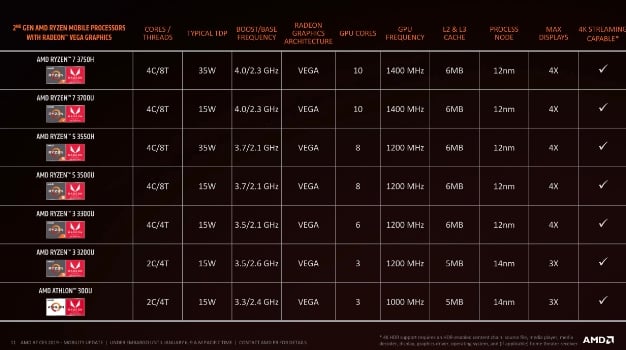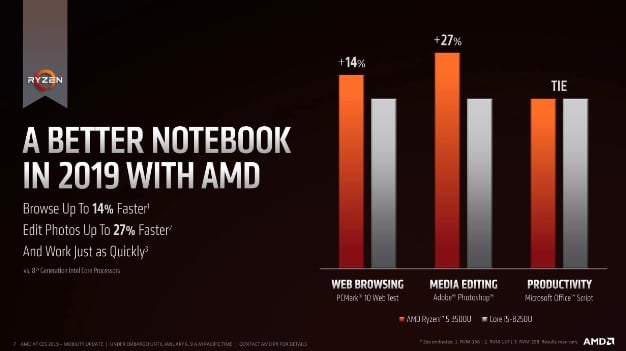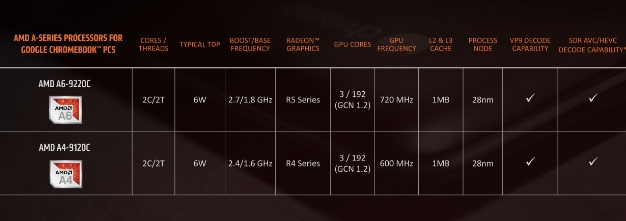AMD Delivers 2nd Gen Ryzen 3000 Mobile CPUs To Battle Intel In The Laptop Arena
AMD announced that its second-gen Ryzen 3000 mobile processors are ready to take on Intel in 2019. These new processors build on the success of the company's first-generation Ryzen Mobile CPUs by extending the product stack and pushing the performance envelope a little further.
The bulk of AMD's mobile Ryzen 3000 processors use AMD's Zen+ core. This is significant because it utilizes an improved 12nm manufacturing process, which has higher efficiency and generally is able to hit slightly higher clock speeds than the original Zen core. This transition is likely responsible for the improvements that AMD was able to bring to its second-gen mobile Ryzen processors.
At the high-end of the product stack sits the AMD Ryzen 7 3750H, followed closely by the Ryzen 7 3700U. These two SKUs both are SMT-enabled quad-core processors with a 2.3GHz base frequency and a 4GHz boost clock. Both of these CPUs also have a Vega-based integrated graphics processor with ten compute units that support a total of 640 stream processors that are clocked at 1,400MHz.
The key difference between these two SKUs is their typical TDP; the 3750H has a 35W typical TDP rating, whereas the 3700U has a lower TDP of just 15W. Due to the difference in TDP, in most scenarios the Ryzen 7 3750H will have a performance advantage, but the two processors may perform identically in some tasks.
It's also worth noting that the Ryzen 7 3750H may also be slower than AMD's first-generation mobile Ryzen 7 2800H, which has a higher 3.3GHz base clock, a 10% larger iGPU with 704 cores, and a higher 45W TDP. The Ryzen 7 3750H will almost certainly be more efficient than the 2800H, and the reduced base clock was likely done on purpose by AMD to better regulate the processor's power and frequency. We will have to wait and see if it can also outperform the last-gen product though.
Venturing further down the product stack we see another 35W TDP processor labelled as the Ryzen 5 3550H. Like the above processors, this also is an SMT-enabled quad-core processor. This SKU is clocked slightly lower at 2.1GHz with a 3.7GHz boost clock. Processor performance should be just a little behind the Ryzen 7 3750H, and it may even be faster than the 3700U in some workloads thanks to its higher TDP.
The Ryzen 5 3550H has a less powerful graphics processor than its mobile Ryzen 7 3000 counterparts, and it has just eight active compute units that provide a total of 512 stream processors that operate at a lower 1,200MHz clock speed.
The rest of the product line consists predominantly of minor updates to the first-gen product line, but there is one notable exception at the very bottom of the list. AMD announced its first mobile Athlon processor based on the Zen architecture, which will come in the form of the AMD Athlon 300U. This SMT-enabled dual-core processor uses an original Zen core that is constructed with 14nm transistor technology. AMD intends to use this SKU as a low-cost offering to better target budget-oriented notebook designs.
AMD also gave us a sneak peak at how these new SKUs will perform. AMD tested one of its new Ryzen 5 3500U processors against an Intel Core i5-8250U, which is also a Hyper-Threaded quad-core CPU with a 15W TDP. In these tests, AMD claimed that the two SKUs tied in a Microsoft Office-based productivity test, but the company showed the Ryzen 5 3500U performed 27% better in an Adobe Photoshop test and 14% better in PCMark 10's web test.
Both of these systems were equipped with 2x4GB of DDR4 RAM, but the rest of the system parameters weren't disclosed so we can't be entirely certain how accurate these results are.
To target the ultra-low-end mobile market segment, AMD also introduced two new 8th Gen Excavator CPUs classified as the AMD A6-9220C and the AMD A4-9120C. These products are markedly similar to existing products that have the same SKU name without the C suffix. Essentially, AMD took these existing products, reduced their TDP from 15W to 6W, reduced the CPU clock speed, and slightly increased the GPU frequency.
AMD intends to use these products to enter the Chromebook market, where it believes these SKUs will be highly competitive against Intel's Celeron and Pentium processors. AMD already has a design win under its belt here, and Acer announced that its upcoming Chromebook 315 will utilize these new CPUs.
By extending its product lineup, AMD anticipates a year of strong controlled growth with a 33% greater uplift in sale in 2019 compared to the previous year. As we move through CES and through the rest of the 2019, expect to see several new products based around both AMD's 2nd Gen mobile Ryzen 3000 and 8th Gen Excavator processors. It appears that 2019 will be another strong year for the red team.





